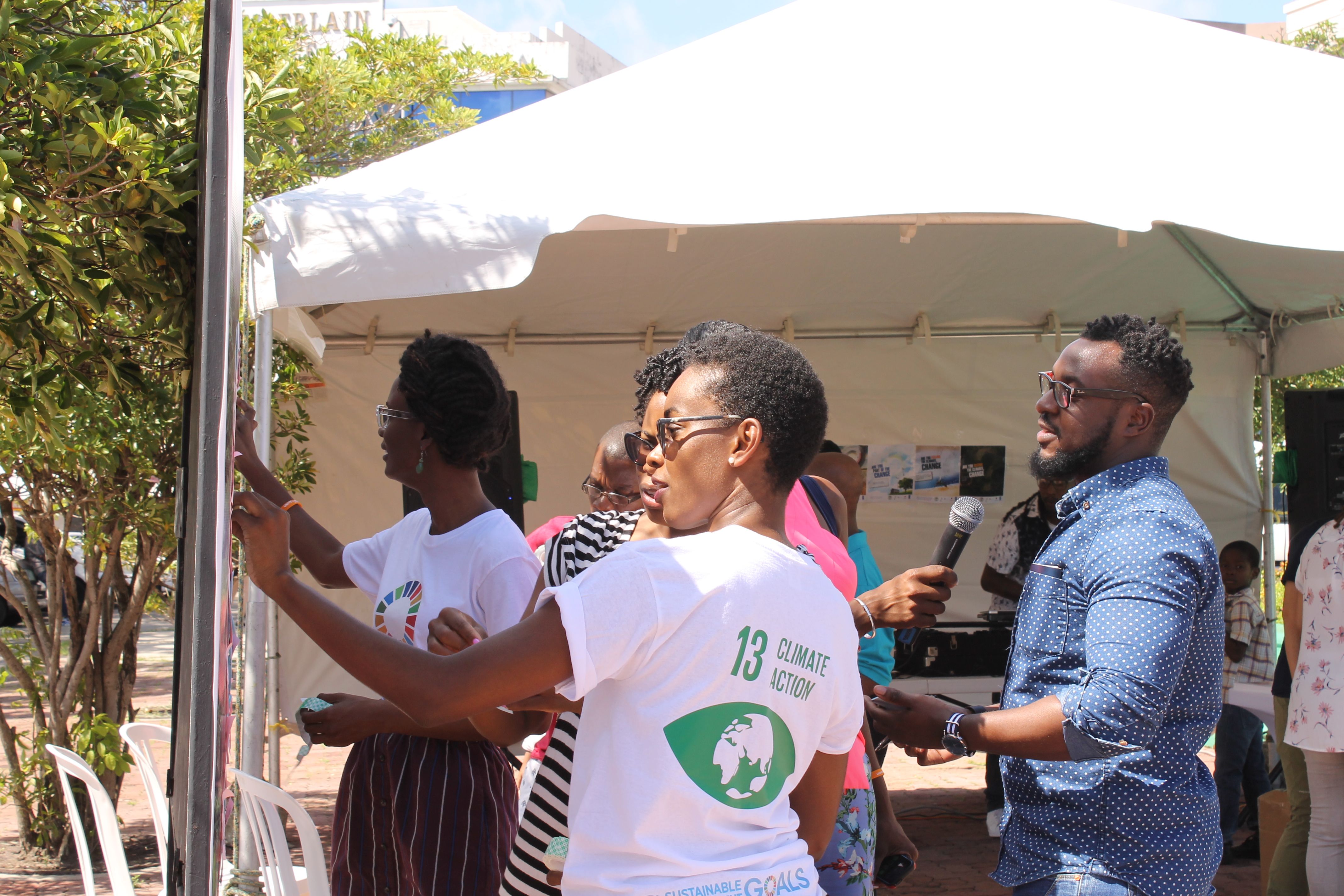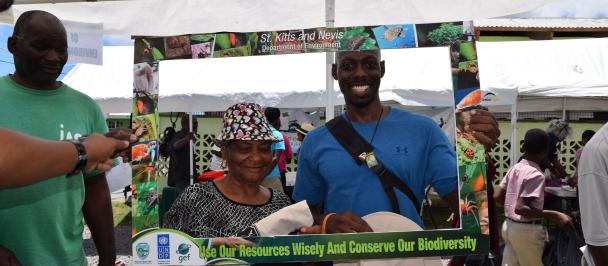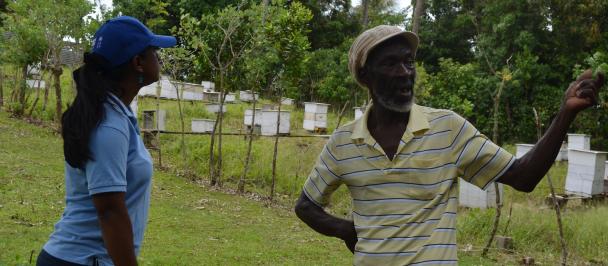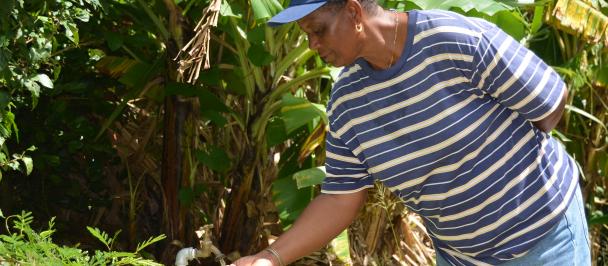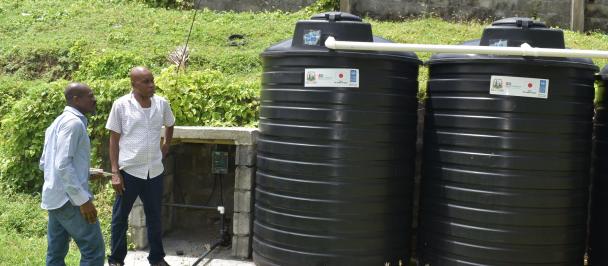UNDP representatives at a climate change event in Barbados.
It’s always easier to sit in an effortless commonplace than to compete with the best.
I lived in Dhaka twenty years ago, when Bangladesh became the tenth test-playing nation of the world. Ensued a tough period for the Tigers, who had to measure up against the greats of the sport, West Indies included. Conversely, Barbados has graduated into the leading group of welfare nations, and that’s not easy to live up to. At the 56th position of the world, the country just makes it into the top cluster as measured by UNDP, since Nobel Laureate Amartya Sen initiated the Human Development Reports (HDR). A mix of economic output and fairness, eradication of poverty, preservation of natural resources, protection of freedoms, encouragement to dynamic entrepreneurship, inclusion of those in need and respect for women’s rights, makes Barbados’ prosperity similar to Malaysia or Uruguay’s, lying well-ahead of The Seychelles, Mauritius or Trinidad and Tobago.
Barbados is a great place to live
It’s also a very good place to be from. “Make Barbados the best place to live, work and enjoy life”, as Prime Minister the Hon. Mia Amor Mottley exhorted her country to become, in her budget speech a year ago. If you are Barbadian, you will probably enjoy a good education and live long and healthy years until you are quite old. Your income will often be decent, just like your government and business leaders. Barbados’ low fertility rate will remain stable at 1.8%. Less than half of the people live in urban areas, combining rurality with quality of life – for instance, through a quasi-universal connection to the grid.
But the country is not catching up…yet. Amidst a very cruel financial crisis, since 2012 Barbados dropped four positions in the world’s wellbeing ranking, according to the 2018 HDR Statistical Update. Instead of taking off, it has fallen back. Three reasons: first, gender inequality. Other nations’ women have made more progress. Education is nevertheless a good provider of equal opportunity, as Barbadian girls will study three years more than boys; and 92% of girls will complete their secondary education. That’s like Japan and way better than the U.K.! However, data of the labour market show that education has still not offered equality of outcomes, as a painful income gap of around 30%, and relegation to less attractive employs, glaringly show. Significant improvements in access to health services – resulting in a relatively low maternal mortality rate – have however not been followed by an equally low adolescent birth rate, fortunately on the decline, but probably the consequence of a short prevalence of contraceptives and high unmet family planning needs.
Second, the Bajan workforce is mortgaged by close to 10% unemployment (and just under 30% of youth unemployment). Barbados is a fully-fledged service economy, like Hong Kong, The Bahamas or Singapore – with less diversification and more vulnerable jobs. Money, as elsewhere in the Caribbean, is expensive and hard to get for entrepreneurs looking for credit and capital. Third, better health outcomes are needed. Much of the Bajan health expenses are directed towards hospitals and contributed by the patients and their families, out-of-pocket. Barbados could have a stronger immunization coverage of infants against DPT and measles, do better on stunting, infant mortality, or food deficit (31 Kilocalories pp/day). Barbados’ current health expenditure remains, according to PAHO, at 7.5% of its GDP – more than Trinidad and Tobago or most of the OECS, but still below the best healthcare systems who spend 10% and above.
Strong Foundations for the Future
Despite the “slowdown factors”, the quality of Barbados’ human development is easily traceable in facts and figures. Twice as many hospital beds as The Bahamas, 25 Physicians and 60 nurses per 10,000 people (top of the region), an excellent pupil-teacher ratio (13:1 in primary education), a fully Internet-connected school network, and quasi-universal antenatal care, birth attended by skilled health personnel, improved drinking water sources and sanitation facilities, complete an enviable set of achievements.
Barbados’ GDP is significant for the size of its economy, but its growth is too slow and its debt too high. Interestingly, the country’s fiscal system allows the Government to invest about 29% of the annual GDP collected through tax revenue. Less direct taxes on economic receipts and more taxes on economic activities (high indirect taxation) seems to be the mix in the Bajan fiscal recipe.
Barbados is also a nation with good human security. Almost all births are registered. There are no Barbadian refugees, internally displaced persons or homeless victims of disasters. The prison population is high but despite recent incidents, the levels of violent crime (and the suicide rates) are among the lowest of the world. Barbados is part of the globalized economy, a tourism powerhouse, a net recipient of FDI, development aid, remittances and immigrants, but also a connected society (ITU’s ICT Development Index ranks Barbados 3rd in the Americas after the US and Canada!), with a great UWI university offer, and reasonable levels of higher education student enrolments abroad. The nation’s energy mix needs more renewables at final consumption to increase the current 13% penetration of renewable energy (RE) capacity on the grid, mostly intermittent solar photovoltaic, and the 2.8% of RE provided last year. Finally, Barbados has already formalized its commitment to the sustainable management of ocean-based resources at the center of their development strategy. Of the 57 Small Island Developing States, the Bajan Government is the first to establish a Ministry of Maritime Affairs and The Blue Economy. Others may follow that lead.
The country faces clear and specific challenges, starting with its debt negotiations, but enjoys a privileged position in the world. With more jobs and inclusive growth in a resilient blue economy, more equality for girls and women, and higher investments in public health, Barbados would not only be a very good place to live… it would become the “Switzerland of the Caribbean”. As Walt Disney used to say, if you can dream it, you can do it.

 Locations
Locations
